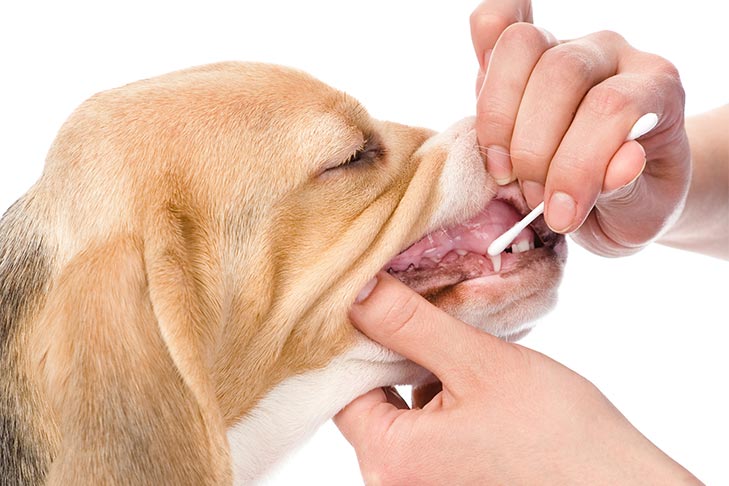- July 16, 2022
- No Comment
- 10 minutes read
What Can Dog DNA Tests Tell You About Your Dog's Health? – American Kennel Club

It’s the day every dog owner dreads: a bad diagnosis that drops out of the blue. These days, an increasing number of pet owners are using dog DNA tests to ward off this sudden heartbreak or help them diagnose existing symptoms. It’s a tempting idea: just take a swab from your dog’s cheek and send it to a lab, the logic goes, and a few weeks later, you’ll know which diseases your dog is genetically at risk of developing, perhaps even before anything goes wrong.
It’s so tempting, in fact, that dog DNA testing companies are proliferating, selling kits costing up to $200 that test for genes associated with more than 160 conditions. But when it comes to predicting disease in dogs, experts in dog genetics and canine health are sounding the alarm about the limitations of DNA testing at its current stage of development.
One of those experts is Dr. Elinor Karlsson, a professor at the University of Massachusetts Medical School and the director of the Vertebrate Genomics Group at the Broad Institute of MIT and Harvard. Dr. Karlsson has been working in canine genetics for many years and is excited about the work that’s emerging, but until recently, she was unaware that some companies are already taking the field’s research directly to pet owners.
“I hadn’t realized that they were using these tests in clinical medicine in the way that they were, and I was kind of shocked by it,” she says. “You know the research, and the research is good, but there are all these caveats on it, and all of a sudden you realize people are using it in a way where they’re not taking those limitations into account, to make decisions about people’s pets.”
What are those caveats? First and foremost, the research is still in its infancy. Scientists have been gathering information about which genes are associated with which conditions, but this is just the beginning of the process. Crucially, correlation doesn’t mean causation, so a gene that often occurs with a particular disease might not cause it. In order to establish causation, scientists need an awful lot of data—sometimes tens of thousands of test subjects.
That’s difficult to achieve even in human medicine. In canine medicine, there’s less funding and more genetic variability because there are so many breeds and crossbreeds of dog, so the research lags even further. “If you get back a positive test meaning that your dog is carrying a genetic variant that has been in a study correlated or associated with a disease,” Dr. Karlsson says, “The one question that you as a pet owner ask is, What is the chance that my dog is going to get sick? And that’s not a question that we can actually answer yet.”
What’s more, some of the companies selling direct-to-consumer tests don’t publish the methods they use to get their results. As the Chief Executive Officer and Chief Scientific Officer of the American Kennel Club’s Canine Health Foundation (CHF), Dr. Diane Brown has overseen the funding of much canine genetic research—and she stressed that peer-reviewed, transparent methodologies are key to good science. “When we’ve got our funded researchers, they publish their research so that everyone can look at it,” she says. “Their results are published in peer-reviewed scientific articles, which are accessible by the public and other scientists. This is how we build upon investments in research. So when you’ve got these closely held industry secrets and it’s proprietary methodology, it becomes very hard to evaluate.”
Then there’s the difficulty of interpreting the results. Because so many tests are being sold direct to consumers, there is a need to help dog owners understand the complex information they’re presented with. For example, some conditions are associated with multiple genes, but genetic testing companies might only test for one of those genes. This might result in pet owners falsely believing their canine companions have the “all clear” from a certain condition. What’s more, veterinarians may not have the expertise to interpret and act upon a panel of genetic tests.
All this has very real consequences. There’s already been at least one case of pet owners having their dog put to sleep on the basis of genetic test results that might have been misinterpreted or over-interpreted. And that’s to say nothing of the unquantifiable level of worry, heartbreak, and sometimes false confidence these tests might stir.
For all these limitations, there’s tremendous value in the emerging science around dog genetics, and a lot to be excited about. In particular, breeders are already using peer-reviewed, high-quality genetic research, with the aim of reducing or even someday eliminating certain conditions from the breeding pool.
For instance, Dr. Diane Brown talked of the solid science that identified the DNA behind exercise-induced collapse (EIC), a genetic condition that causes dogs to lose control of their muscles after intense exercise. A test for this condition now allows breeders to check whether a particular dog has the gene before breeding them. There’s been similar success with a test for copper toxicosis in Bedlington Terriers, a condition in which the liver doesn’t process and expel copper, leading to illness and death.
But the use of genetic testing to decide whether to breed particular dogs is very different to using these tests in clinical medicine. In clinical medicine, the question is not whether a particular dog’s genes should be carried to the next generation, but rather concerns the fate of an existing dog—decisions too serious to be left to science that’s only part of the story.
All the same, geneticists are clear on one thing: we’re on the cusp of a true treasure trove of genetic information about dogs and humans alike. Within ten years, Dr. Karlsson hopes that tests will be able to show which dogs are at high risk of developing serious conditions such as heart disease and certain cancers, allowing their owners to establish suitably healthy lifestyles and implement a regime of X-rays or other screening tests early, to optimize the dog’s chances of living a long and happy life.
But it’s important to remember that the science isn’t fully there yet.

Dr. Brown also urges dog owners to consider genetic testing as just one tool in their toolbox. Anyone thinking about getting a new dog, or working to take the best possible care of their current dog, should educate themselves, she says, by reading the breed information on AKC.org and by checking the Orthopedic Foundation for Animals’ (OFA’s) CHIC (Canine Health Information Center) Program, which recommends screenings for particular breeds.
“You need to look at the overall health of the dog that you’re thinking about,” she says. “What did the pedigree look like? What did the parents look like? What did the siblings look like? Do that sort of homework. What is required to be tested in that particular breed? I think that making decisions on the health and breeding of a particular dog needs to go far beyond just a single reference point and far beyond a single test. It needs to be looking at the dog as a whole.”
Dr. Karlsson adds that, though canine genetic testing for health must currently be taken with a grain of salt, dog owners themselves can help move the field along, by supplying some of the data scientists need. “We need to know when a dog is carrying a variant that’s been associated with a disease, do they get sick or don’t they get sick? That’s what we need to figure out, and that has to be a collaboration with dog owners.”
Working together with the AKC Canine Health Foundation to participate in peer-reviewed, humane research studies for the health of dogs. and submitting samples to OFA CHIC are ways to help. Another way to help is to sign up for Dr. Karlsson’s citizen-science project, Darwin’s Ark, and submit your dog’s genetic information.
The sooner scientists can access the information they need, the sooner we’ll arrive at the day so many dog owners are waiting for: a day when comprehensive genetic screenings can keep beloved pets healthy for as long as possible.
AKC is a participant in affiliate advertising programs designed to provide a means for sites to earn advertising fees by advertising and linking to akc.org. If you purchase a product through this article, we may receive a portion of the sale.

